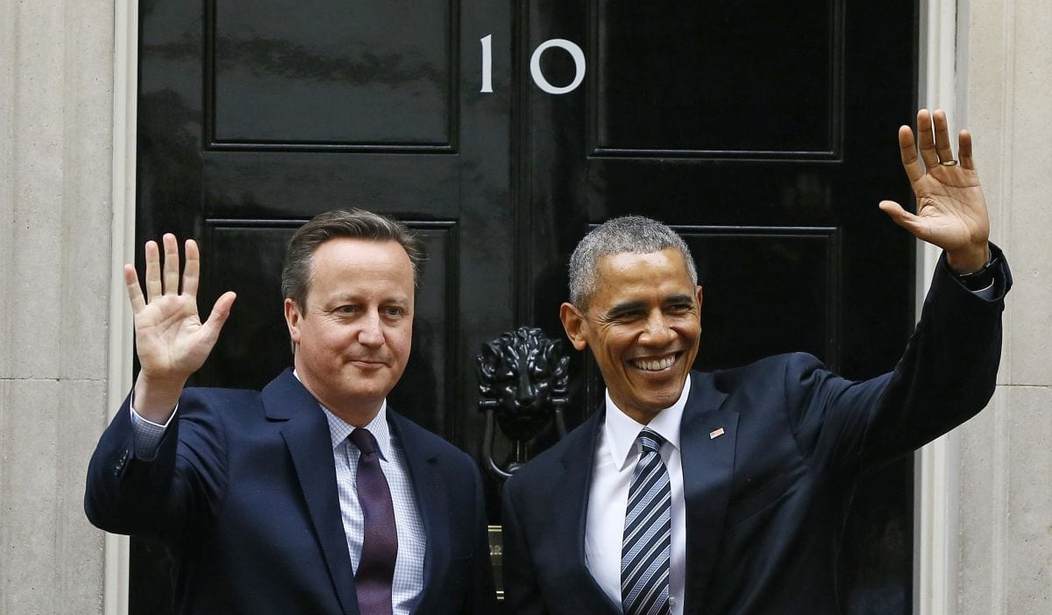President Obama stuck his nose in the Brexit question in Great Britain, provoking outrage and scorn when he threatened the Brits by warning that if they left the EU, the UK would be “at the back of the queue” on any trade deal.
Obama claimed that his threat wasn’t a threat but rather he was trying to “enhance the debate.”
At a press conference with Prime Minister Cameron, a BBC reporter asked the president if it was any of his business whether the UK remained in the EU.
“Thank you, Mr. President. You’ve made your views very plain on the fact that British voters should choose to stay in the E.U. But in the interest of good friends always being honest, are you also saying that our decades-old special relationship, that’s been through so much, would be fundamentally damaged and changed by our exit? If so, how? And are you also, do you have any sympathy with people who think this is none of your business?” the reporter asked.
“And Prime Minister, to you, if I may, some of your colleagues believe it’s utterly wrong that you have dragged our closest ally in the E.U. referendum campaign, what do you say to them?” the reporter asked. “And is it appropriate for the Mayor of London, Boris Johnson, to have brought up President Obama’s Kenyan ancestry in the context of this debate?”
Obama’s lecture to the Brits included references to World War II and the creation of NATO as examples of how America and Great Britain have cooperated in the past. But the president had people shaking their heads in disbelief because the U.S. had nothing to do with the creation of the EU.
The U.S. president said he feels it’s his prerogative to clarify the U.S. position rather than have it defined by British politicians.
“So they are voicing an opinion about what the United States is going to do, I figured you might want to hear from the president of the United States what I think the United States is going to do,” he said.
“And on that matter, for example, I think it’s fair to say that maybe some point down the line there might be a UK-US trade agreement, but it’s not going to happen any time soon because our focus is in negotiating with a big bloc, the European Union, to get a trade agreement done.”
He added, ‘The UK is going to be in the back of the queue.”
Obama brought up WWII and the international institutions the US and UK designed together including the United Nations, the IMF, the World Bank, and NATO.
“All of those in some degree constrained our freedom to operate and occasionally we had to deal with some bureaucracy,” he said, “it meant that on occasion we had to persuade other countries and we don’t get 100 percent of what we want in each case but we knew that by doing so, everybody was going to be better off.”
He again the UK involvement in the EU “magnifies” the nation’s power – “it doesn’t diminish it” and argued that “divisions in Europe” would weaken NATO.
“That’ll have an impact on our collective security,” he stated. “I have a confidence in the UK, and I know that if we are not working effectively with Paris or Brussels then those attacks are going to migrate to the United States and to London, I want one of my strongest partners in that conversation.”
Hitting back at his critics, Obama said, “All of us cherish our sovereignty – our country is pretty vocal about that – but the US also recognizes that we strengthen our security through our membership of NATO, we strengthen our prosperity through organisations like the G7 and the G20.”
“I believe the UK strengthens both our collective security and prosperity through the EU.”
The British people aren’t feeling enriched or prosperous as a result of their membership in the EU. And complying with all the directives and regulations coming out of Brussels — many times at the expense of their own industries — rankles them even further.
With Germany dominating the EU, the UK usually gets lost in the shuffle. Perhaps it’s time for Great Britain to flex its considerable financial muscle and either wring further concessions from the EU or go it alone.
Despite the scare tactics of pro-EU politicians, Great Britain should approach this question as rationally as possible: do the costs of EU membership outweigh the benefits?
Many will answer in the affirmative.










Join the conversation as a VIP Member